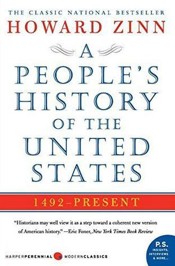A People’s History of the United States

the author of this book makes a good point in the afterword: all facts promote or minimize a viewpoint, merely by their selection. So, choosing to retell or convey a fact promotes some point-of-view because that fact tells a story. And conveying that fact means you want to tell that story, and not another.
(Politicians are great at this on the campaign trail, when they tell stories of people they met and how those meetings further their agenda. They don’t tell all the stories of people who don’t contribute to what they’re trying to sell.)
The author is certainly guilty of this, by his own admission. He wanted to tell the history of the United States through facts that don’t normally get told. These facts all relate to the underclass, the oppressed, the marginalized. The result is a 700-page history of the U.S. that’s not at all flattering. He tells of race wars, class struggle, systemic oppression, propaganda, war profiteering, and the list goes on and on.
And on.
And on.
And that was my biggest problem with the book: in the end, it’s a long slog through story after story of how the U.S. screwed its own citizens and the world. Every chapter has a theme, and you begin each chapter with some sense of dread, thinking, “How is he going to rant and rave this time?”
I don’t doubt the veracity of the book. But if any of this surprises you, then you haven’t been paying attention. Our government clearly does some Very Bad Things, and deep inequality and oppression is baked into our society. But I knew this already, so the book was less a revelation and more of a long journey where one story sort of bled into the next, until I was just trying to get the damn book finished.
(Sometime after reading it, I blogged about the bias and perspective brought up by the book.)
Book Info
- I have read this book. According to my records, I completed it on .
- A softcover copy of this book is currently in my home library.